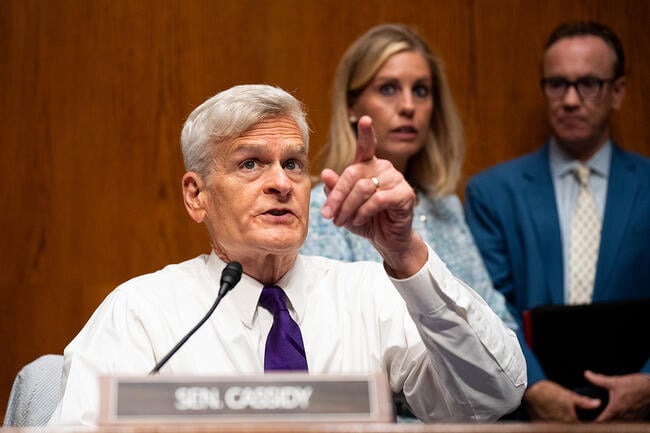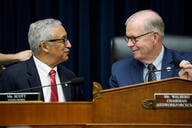You have /5 articles left.
Sign up for a free account or log in.

Sen. Bill Cassidy, the Louisiana Republican who chairs the Senate education panel, helped to draft the Senate’s proposed higher ed overhaul.
Bill Clark/CQ-Roll Call Inc./Getty Images
A plan to expand the Pell Grant to students in short-term workforce programs was cut from a budgetary megabill early Thursday morning despite immense bipartisan support. It was one of several higher education–related provisions that a Senate official struck down.
Other provisions that violate Senate procedural rules included plans to consolidate student loan repayment options for current borrowers, limit grant access for noncitizens and exclude medical residents from a loan-forgiveness program. But the decision against expanding grants shocked some higher education experts who expected Congress to finally pass the proposal after years of trying.
“It’s been abundantly clear for years now that many low-income students don’t have the finances to take advantage of the programs that would be made eligible by workforce Pell and therefore they don’t have the opportunity to benefit,” said David Baime, senior vice president of government relations for the American Association of Community Colleges. “There has been such strong support that a successful challenge was not necessarily something that we anticipated.”
However, Sen. Tim Kaine, a Virginia Democrat who has long supported the concept known as workforce Pell, was less confounded.
“At every turn, President Trump and congressional Republicans’ process for this partisan megabill has been mired by chaos and infighting,” Kaine said in a statement to Inside Higher Ed. “It’s no surprise that many provisions are being removed and changed.”
It’s a win for critics of the provision, who argued it lacks critical guardrails and would lead to a spike in unaccredited, for-profit programs. But Baime is hopeful that the provision can be salvaged and reintroduced.
If reintroduced, the provision would have to undergo the same sniff test as the first workforce Pell. The test, known informally as the Byrd bath, is necessary because Republicans are using a special legislative process known as reconciliation to pass the bill.
Under reconciliation, the bill can pass the Senate with 51 votes instead of the normal 60. But lawmakers have to stick to the reconciliation rules. For instance, all of the policies in the bill must either generate a new form of revenue, cut costs or instill new government spending.
A nonpartisan Senate official, known as the parliamentarian, signs off on whether each provision adheres to the rules, though senators can overrule the official with 60 votes—unless senators can secure 60 votes to overrule the parliamentarian’s ruling, what he or she says goes.
The current parliamentarian, Elizabeth MacDonough, didn’t publicly explain her decision, which was released by Democrats on the Senate budget committee. MacDonough also rolled back key cuts to Medicaid, enraging many Republicans. Some are even calling for her to be fired.
“Unelected bureaucrats think they know better than U.S. Congressmen who are elected BY THE PEOPLE,” Sen. Tommy Tuberville of Alabama wrote Thursday on X. “Her job is not to push a woke agenda. THE SENATE PARLIAMENTARIAN SHOULD BE FIRED ASAP.”
As a whole, the legislation known as the One Big Beautiful Bill Act aims to fund President Donald Trump’s policy priorities, like extending tax cuts for the wealthy and cracking down on illegal immigration. But without the cost savings of multibillion-dollar cuts to Medicaid, Republicans face a major setback in balancing the budget.
Lawmakers also were counting on about $275 billion in savings from rolling back an income-driven repayment plan known as Saving on a Valuable Education, or SAVE, which the Biden administration put in place but the federal courts have blocked. Some higher education experts, including Preston Cooper, a policy analyst at the conservative think tank the American Enterprise Institute, believe the parliamentarian’s ruling on consolidating repayment plans bans the Senate from taking the final step to kill SAVE. If Cooper and others are right, that could cost the Senate even more.
Regardless, the Senate’s self-imposed deadline of July 4 to pass the bill now seems nearly impossible. But higher education experts are still keeping a close eye on the megabill, because if it does pass—even with the cuts that have been made—it could have serious consequences for colleges and universities.
Accountability In
One thing that did clear the parliamentarian’s review was the Senate’s plan to hold colleges accountable for students’ earnings. Much like the workforce Pell ruling, this was unexpected by many higher education policy experts. They say that now the odds of colleges facing new consequences for their students’ outcomes are higher than ever.
“We have an accountability construct that is likely going to be in the Higher Education Act for the first time ever,” said Emmanual Guillory, senior director of government relations at the American Council on Education. “The primary focus should be on what is actually remaining.”
The measure, which senators are calling the “No Harm Done Plan,” would terminate federal loan access for any academic programs at the associate level or higher that fail to ensure its students earn more than they would without a degree. Programs that fail the test for two out of three consecutive years would be cut off from loans.
Meanwhile, the House plan would take an entirely different approach by putting colleges on the hook for unpaid student loans. Unlike the Senate, the House’s measure, known as risk-sharing, would affect the majority of colleges, using a complex formula to charge them an annual fee for their students’ unpaid loans.
Higher education lobbyists have shown much more support for the Senate’s plan, though they still want to see some changes.
And the bill still has a long way to go before becoming law. The parliamentarian hasn’t yet ruled on rolling back consumer protection regulations put in place by the Biden administration. Even if the legislation passes the Senate, House Republicans will likely make their own changes, which would require a second round of Byrd bath tests.
For example, if risk-sharing were to replace the do-no-harm provision, the parliamentarian would need to sign off. Knowing this, higher education lobbyists continue to make their case to lawmakers about why they should rethink the accountability measures.
“There has to be a compromise between the House and the Senate on what will ultimately be signed by the president,” Guillory said. So “we are still working with [House] committee staff in order to make them aware of the impacts of their proposal[s] with publicly available data that we have access to and trying to do the best we can to avoid any unintended consequences with the proposal. We are trying to make the outcome as best for students as possible.”




